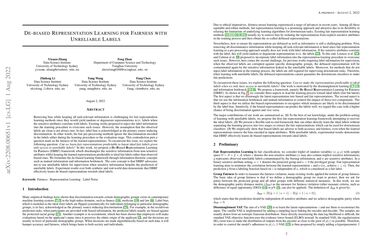De-biased Representation Learning for Fairness with Unreliable Labels
Removing bias while keeping all task-relevant information is challenging for fair representation learning methods since they would yield random or degenerate representations w.r.t. labels when the sensitive attributes correlate with labels. Existing works proposed to inject the label information into the learning procedure to overcome such issues. However, the assumption that the observed labels are clean is not always met. In fact, label bias is acknowledged as the primary source inducing discrimination. In other words, the fair pre-processing methods ignore the discrimination encoded in the labels either during the learning procedure or the evaluation stage. This contradiction puts a question mark on the fairness of the learned representations. To circumvent this issue, we explore the following question: \emph{Can we learn fair representations predictable to latent ideal fair labels given only access to unreliable labels?} In this work, we propose a \textbf{D}e-\textbf{B}iased \textbf{R}epresentation Learning for \textbf{F}airness (DBRF) framework which disentangles the sensitive information from non-sensitive attributes whilst keeping the learned representations predictable to ideal fair labels rather than observed biased ones. We formulate the de-biased learning framework through information-theoretic concepts such as mutual information and information bottleneck. The core concept is that DBRF advocates not to use unreliable labels for supervision when sensitive information benefits the prediction of unreliable labels. Experiment results over both synthetic and real-world data demonstrate that DBRF effectively learns de-biased representations towards ideal labels.
PDF Abstract

